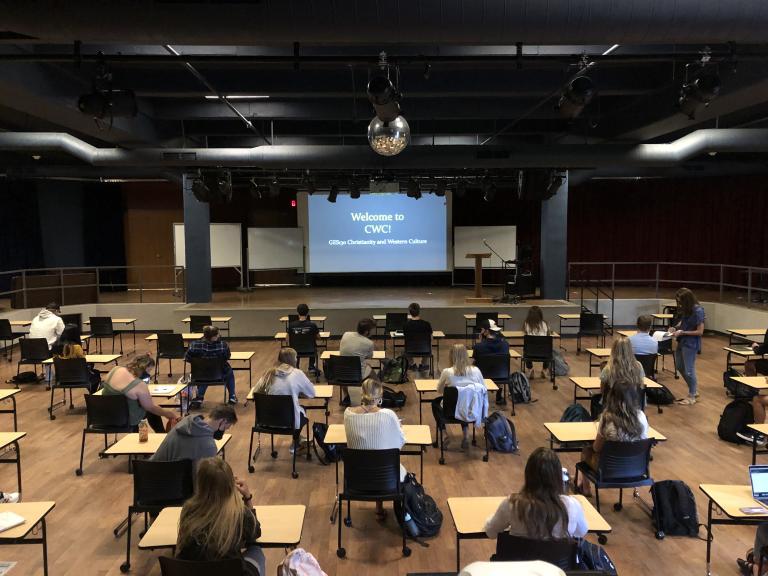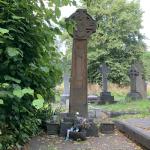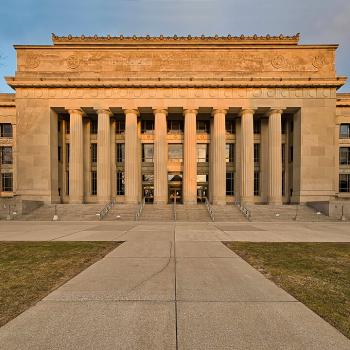I’m now one day into my experience of teaching on a college campus in the middle of a pandemic, and I’ve already sensed a pattern: the more things stay the same, the more they change.
As usual, the semester started with me helping to introduce Christianity and Western Culture (CWC), Bethel University‘s venerable team-taught, multi-disciplinary, first-year, general education course. But I’m usually in a lecture hall, not a socially distanced multi-purpose space with a disco ball hanging overhead.

Awkward as I felt standing on that stage, muscle memory kicked in as I opened with a devotional reflection on what’s long been our theme scripture in CWC:
Therefore, since we are surrounded by such a great cloud of witnesses, let us throw off everything that hinders and the sin that so easily entangles. And let us run with perseverance the race marked out for us, fixing our eyes on Jesus, the pioneer and perfecter of faith. (Heb 12:1-2, NIV)
I’ve talked about these words dozens of times now in this class. The author’s allusion to “a great cloud of witnesses” is an ideal fit with a course that seeks to introduce young Christians to sisters and brothers in Christ from centuries past.
But in a course that’s also meant to help students understand the connections between past and present, this time it felt like I needed to head in a slightly different direction and acknowledge that Hebrews 12 has been in the news, thanks to this portion of Vice President Mike Pence’s address last Wednesday at the Republican National Convention:
Let’s run the race marked out for us. Let’s fix our eyes on Old Glory and all she represents. Let’s fix our eyes on this land of heroes and let their courage inspire. And let’s fix our eyes on the author and perfecter of our faith and freedom and never forget that where the spirit of the Lord is there is freedom — and that means freedom always wins.
I’ve previously taken issue with Pence’s misuse of the New Testament, so I’m not going to belabor what other Christians from across the theological spectrum have already pointed out: that it’s nothing short of blasphemy to substitute symbols of American patriotism for Jesus Christ himself.
Glad Pence seems to know Scripture; grieved & appalled he’d believe substituting “Old Glory” for “Jesus” wasn’t blasphemous and equating the freedom Paul was referring to with civil liberties.
Christians fix our eyes on Jesus, not the flag.
Screenshot credit: @amylpeterson pic.twitter.com/hPt0lkLtcd
— Greg Jao (@GregJao) August 27, 2020
But Pence’s proof-texting seems even more reckless in light of the “therefore” that introduces Hebrews 12. The author wants us to “fix our eyes on Jesus” in light of chapter 11’s stories of women and men who
were still living by faith when they died. They did not receive the things promised; they only saw them and welcomed them from a distance, admitting that they were foreigners and strangers on earth. People who say such things show that they are looking for a country of their own. If they had been thinking of the country they had left, they would have had opportunity to return. Instead, they were longing for a better country—a heavenly one. Therefore God is not ashamed to be called their God, for he has prepared a city for them. (Heb 11:13-16)
Abraham, for example, had the faith to travel “to a place he would later receive as his inheritance… even though he did not know where he was going” (v 8). Christian nationalists often interpret America — Pence’s “land of heroes” — as a latter-day “promised land.” But the author of Hebrews says that Abraham “made his home in the promised land like a stranger in a foreign country; he lived in tents, as did Isaac and Jacob, who were heirs with him of the same promise. For he was looking forward to the city with foundations, whose architect and builder is God” (vv 9-10). Even when he came to the land he’d been promised, Abraham “lived in tents.” (In fact, Genesis’ account of the story has him leave Canaan almost immediately.)
Now, it’s also possible to make too much of the “living in tents” idea. If it’s a mistake to deify any land or country, that needn’t mean that we care nothing for the patch of Earth where we’ve pitched our tents, shrugging at its injustices and inequalities in the confidence that our sojourn here is fleeting. If we long “for a better country—a heavenly one,” does that mean that we long only for the world to come, or can we long for our temporary home to become — however imperfectly — “a better country”?
Our students will spend much of the semester realizing that there’s no simple answer to that question — at least, none that our course’s “great cloud of witnesses” can agree on. But as a challenge to get them thinking about the implications of that question, we start at our chronological finish. After reading from the Epistle to the Hebrews, we read from the greatest epistle written by Martin Luther King, Jr., his “Letter from a Birmingham Jail.”
Again, this is par for the course in CWC. I’ve only known to us to open with MLK, whose argument that Christians are obligated to disobey unjust laws sets up an ancient debate that students will encounter on Friday, when they read from Athenian writers like Sophocles and Thucydides. And our excerpt from King’s letter ends with a powerful image that suggests one potential answer to the course’s overarching question, How should Christians relate to the surrounding culture?
There was a time when the church was very powerful in the time when the early Christians rejoiced at being deemed worthy to suffer for what they believed. In those days the church was not merely a thermometer that recorded the ideas and principles of popular opinion; it was a thermostat that transformed the mores of society….
I’ve challenged students (and myself) with that paragraph dozens of times: What made a persecuted church “very powerful”? Has the church of today traded that kind of power for another? What would it mean for us, individually and collectively, to act as a “thermostat” rather than a “thermometer” in contemporary America?
But this year, I found myself much more interested in pointing students to an earlier passage in the letter. Addressing himself to a group of moderate white clergymen who supported desegregation but thought his methods too radical, MLK compared himself and other protesters to another Athenian our students will read in the next few days:
Just as Socrates felt that it was necessary to create a tension in the mind so that individuals could rise from the bondage of myths and half-truths to the unfettered realm of creative analysis and objective appraisal, so must we see the need for nonviolent gadflies to create the kind of tension in society that will help men rise from the dark depths of prejudice and racism to the majestic heights of understanding and brotherhood.

“For if you kill me,” Socrates tells his fellow citizens in Plato’s Apology,
you will not easily find another like me, who, if I may use such a ludicrous figure of speech, am a sort of gadfly, given to the state by the God; and the state is like a great and noble steed who is tardy in his motions owing to his very size, and requires to be stirred into life. I am that gadfly which God has given the state and all day long and in all places am always fastening upon you, arousing and persuading and reproaching you.
The task of such a God-given “gadfly,” said King, was to use “nonviolent direct action… to create such a crisis and foster such a tension that a community which has constantly refused to negotiate is forced to confront the issue.” That’s obviously relevant after months of mass protests over the same enduring issue that King sought to confront.
On a campus mere miles from the spot where George Floyd was killed, a classroom like ours might seem nothing like the site of a mass protest. But I told students that the task of a professor in a class like CWC can be as gadfly-like as King’s: “to create a tension in the mind,” so that we can “rise from the bondage of myths and half-truths to the unfettered realm of creative analysis and objective appraisal.” If the liberal arts are “liberating arts,” then we must first experience the tension that will lift us “from the dark depths of prejudice and racism to the majestic heights of understanding and brotherhood.”
And when I say “we,” I need to start with “me,” and only then come to my students.
Even before I said a word yesterday, I experienced the crisis I meant to create. I felt the tension I always feel when I teach “Letter from Birmingham Jail” and recognize myself more in its recipients than its author. My instinctive response to injustice is to be wary of extremism and eager for order. Left unchallenged, I will always find myself comfortably arrayed among the “white churchmen [who] stand on the sideline and mouth pious irrelevancies and sanctimonious trivialities.”
But I know I’m not alone. In 1963 or 2021, it’s so very easy for “the contemporary church [to be] a weak, ineffectual voice with an uncertain sound… an arch defender of the status quo.” Too often in the last four years, the contemporary church has offered “silent and often even vocal sanction of things as they are” under Mike Pence and his boss. The more things stay the same, the less they change.
So while Pence and I agree that we Christians need to look to the “the author and perfecter of our faith,” I need to point my students to a Jesus who was, in MLK’s words, “an extremist for love, truth and goodness, and thereby rose above his environment.” When Pence exhorts Americans to stare at “Old Glory and all she represents,” I have to confront students with an American past that is truly a foreign country to anyone called to sojourn in this unjust land yet yearn for “a better country—a heavenly one.”
In this year when things have changed — but not enough — I pray that God will make such words something more than “pious irrelevancies.”












